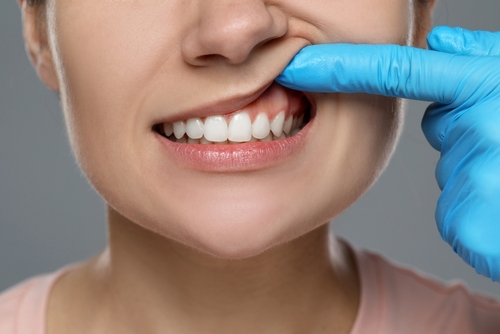Combat Gum Disease at Tuckerton Dental
 At Tuckerton Dental, our Tuckerton, NJ dentist, Dr. Ronald Petrosky, and our experienced team of dental professionals are dedicated to helping patients achieve healthy gums and maintain optimal oral health. Our primary goal is to educate our patients on common dental ailments and their prevention to avoid serious oral health problems. Gum disease, a prevalent condition, can lead to severe oral health problems if left untreated.
At Tuckerton Dental, our Tuckerton, NJ dentist, Dr. Ronald Petrosky, and our experienced team of dental professionals are dedicated to helping patients achieve healthy gums and maintain optimal oral health. Our primary goal is to educate our patients on common dental ailments and their prevention to avoid serious oral health problems. Gum disease, a prevalent condition, can lead to severe oral health problems if left untreated.
We customize our approach to each patient’s unique needs and goals, offering non-surgical treatments to periodontal surgery. We’re committed to providing exceptional care and helping our patients achieve a healthy, confident smile at our Tuckerton dental office. To learn more about effective gum disease treatment options, contact our Tuckerton dental office by calling (609) 296-1007.
What Is Periodontal Disease?
Gum disease, also known as periodontal disease, affects the gums and surrounding tissues of the teeth. It’s caused by bacterial buildup and plaque on the teeth, which can lead to inflammation, swelling, and infection. Additionally, certain risk factors increase the likelihood of developing gum disease, including smoking, hormonal changes, certain illnesses and medications, genetics, and specific behaviors such as poor oral hygiene. If left untreated, gum disease can cause serious damage to the teeth and gums, leading to tooth loss and other health complications.
Stages of Gum Disease
Gum disease is typically divided into three stages: gingivitis, periodontitis, and advanced periodontitis. Each stage of gum disease requires different levels of treatment. It’s important to address the condition as early as possible to prevent further damage.
Gingivitis
This is the earliest stage of gum disease, often referred to as mild gum disease, and is characterized by inflammation and swelling of the gums. Symptoms of gingivitisinclude redness, swelling, tenderness, and bleeding gums. Your Tuckerton dentist can treat gingivitis through dental cleanings and by encouraging patients to maintain good oral hygiene habits at home.
Periodontitis
This is the second stage of gum disease and occurs when the inflammation and infection spread from the gums to the surrounding tissues and bone. Symptoms of periodontitisinclude receding gums, deep pockets between the teeth and gums and bone loss. Treatment for periodontitis may include scaling and root planing, antibiotics, and surgery.
Advanced Periodontitis: Severe Gum Disease
This is the most severe stage of gum disease, often referred to as severe gum disease or advanced periodontitis, and occurs when the infection has spread deep into the tissues and bone. Symptoms of advanced periodontitis include severe bone loss, tooth loss, and gum recession. Treatment for this stage may include gum grafting, bone grafting, and tooth extraction, addressing the progression and effects of periodontal disease on the gums, bone, and teeth.
Oral Hygiene and Gum Disease Treatment Options

- Professional Cleaning: Dental cleanings are simple and effective ways to remove plaque and bacteria from the teeth and gums. During a professional cleaning, a dental hygienist will use specialized tools to remove buildup from the teeth and gums, leaving them clean and healthy.
- Scaling and Root Planing: Scaling and root planing is a deep cleaning procedure that removes plaque and bacteria from below the gum line. This procedure is typically used to treat periodontitis and can help prevent further damage to the teeth and gums.
- Laser Periodontal Therapy: Laser periodontal therapy is a minimally-invasive treatment option for gum disease that utilizes laser technology to remove infected tissue and promote healing. This treatment can be an effective alternative to traditional gum surgery, with less pain, swelling, and downtime.
- Bone and Gum Grafting: Bone and gum grafting restores lost bone and gum tissue due to advanced gum disease or tooth loss. During the procedure, grafts of bone or tissue are taken from other areas of the mouth or a donor source and transplanted to the affected area to promote new tissue growth.
- Antibiotics: Antibiotics can help kill the bacteria that cause gum disease and reduce inflammation and infection.
- Surgery: In some cases, surgery may be necessary to treat advanced gum disease.
In addition to these treatments, it’s crucial to maintain good oral hygiene practices, including brushing teeth twice a day with fluoride toothpaste, to prevent gum disease. Using fluoride toothpaste is an essential part of daily oral hygiene practices to maintain good oral health and prevent gum disease.
Costs of Gum Disease Treatment
The cost of treating gum disease involves several financial factors, including the severity of the condition, the recommended treatment plan, the location of the dental clinic and the chosen dental professional. The range of costs can vary widely, from less invasive procedures like scaling and root planing that offer a more affordable option, to more complex surgical interventions such as gum flap surgery or bone grafting which can be more expensive.
It’s important to understand that investing in gum disease treatment is necessary for maintaining oral health and preventing further complications. Delaying treatment or ignoring symptoms can lead to more extensive and costly dental procedures in the future. To get a clearer understanding of the specific cost tailored to your individual circumstances, discuss financing options with Dr. Petrosky.
Frequently Asked Questions
Yes, gum disease can be prevented by practicing good oral hygiene habits, such as brushing twice a day, flossing daily, and visiting your dentist regularly for professional cleanings and checkups. It’s also recommended to follow the American Dental Association’s advice on proper tooth brushing and cleaning practices to prevent gum disease.
Symptoms of gum disease include redness, swelling, bleeding, and tenderness of the gums. Recognizing the warning signs of gum disease, such as gum recession, loose teeth, and bone loss, is crucial for early detection and prevention of further health risks. If you’re experiencing any of these symptoms or warning signs, see your dentist for an evaluation.
No, gum disease is not contagiousin the way that colds or the flu are. However, the term ‘periodontal disease contagious’ often comes up because bacteria that cause gum disease can indeed be spread through saliva. This means if you kiss someone with gum disease or share utensils and drinking glasses with them, there’s a risk of transferring these harmful bacteria. It’s crucial to understand that the bacterial transfer doesn’t occur by merely being close to someone. Typically, a dentist diagnoses gum disease and may refer patients to a periodontist for further tests and treatment to manage these bacteria effectively. Therefore, practicing good oral hygiene habits is essential to prevent the spread of bacteria and protect your gum health.
Yes, gum disease has been linked to other health problems, including heart disease, stroke, diabetes, and coronary artery disease. Maintaining good oral hygiene and treating gum disease promptly can help reduce the risk of these health complications.
Protect Your Smile Against Gum Disease At Tuckerton Dental
If you are experiencing symptoms of gum disease or have concerns about your oral health, we are here to help you fight this condition. You can schedule an appointmentat our Tuckerton, NJ dental office by calling (609) 296-1007 to receive the care and support you need to maintain healthy teeth and gums. We look forward to helping you achieve a healthy and beautiful smile!